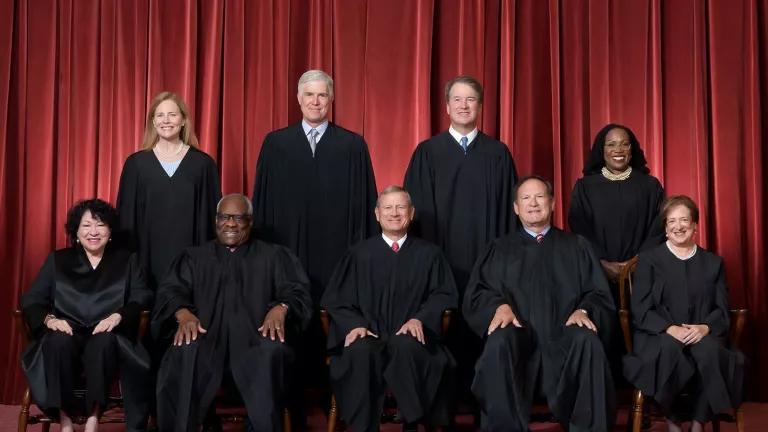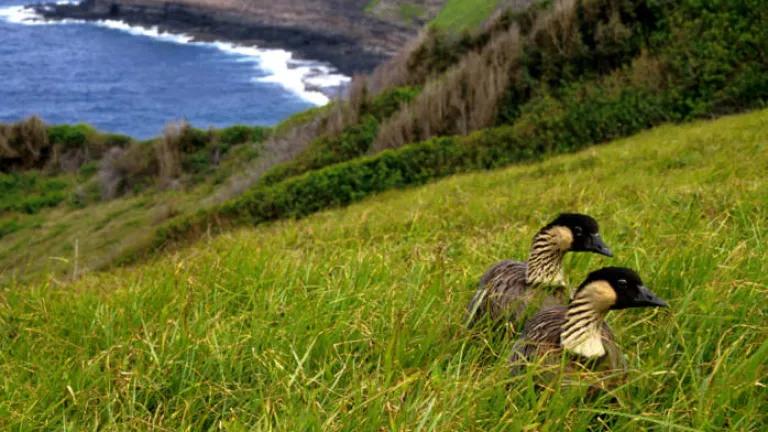Giving Birds a Fighting Chance
The Biden administration has officially revoked Trump’s cuts to the Migratory Bird Treaty Act—and more promising actions are on the horizon.

An American bald eaglet sits with one of its parents in the nest off the Zumbro River in Rochester, Minnesota.
Robert E. Klein/AP
The Biden administration has officially revoked Trump’s cuts to the Migratory Bird Treaty Act—and more promising actions are on the horizon.
The revocation of the illegal Trump rule gutting the Migratory Bird Treaty Act (MBTA) is officially going into effect. While this is a critical backstop in upholding a bedrock bird conservation law, overall success for birds will hinge on accompanying regulatory processes that are just beginning.
By now, many of us have heard the devastating statistics on past and expected future bird declines—three billion birds lost over the last three decades and two-thirds of North American species threatened by climate change. Thankfully, the Biden administration has joined the call for immediate action to reverse this unprecedented loss and improve policies for bird conservation.

A black-capped chickadee in Glacier National Park
In addition to revoking the previous administration’s unlawful reinterpretation of the century-old MBTA, the U.S. Fish & Wildlife Service (FWS) has initiated two rulemakings to improve avian conservation efforts: one targeted at eagle conservation and the other impacting more than 1,000 species, ranging from backyard birds to our most imperiled avian friends.
Both efforts are examining actions to decrease human-caused bird deaths and more specifically, address industrial activities that have measurable impacts with known solutions to decrease those impacts. And each effort needs our help to get across the finish line because naysayers continue to glom onto the notion that this is unfair punishment of industry actors and a drop in the bucket to counteract the most significant impacts to birds.
From our perspective, though, we are simply asking for responsibility for the foreseeable consequences of repeated industrial activity that’s killing birds, especially where we already have commonsense tools to avoid that loss. This is low-hanging fruit, not a drop in the bucket, and if done right, it can reward and promote industry efforts to institute protective bird measures. As the Intergovernmental Panel on Climate Change and Intergovernmental Science-Policy Platform on Biodiversity and Ecosystem Services have laid bare, there’s no time more apt to counteract unprecedented population-level bird declines.
For eagles, the current, underutilized permitting system leaves too many activities unaddressed and too many eagle conservation actions off the table. NRDC submitted detailed joint comments with renewable industry and conservation partners containing ready-to-implement solutions. We spent more than a year working together to build a proposal that ensures the protection of our cherished eagle populations while simultaneously providing workable regulatory solutions for rapidly scaling up clean energy.

Five oiled snowy plovers were recovered from the Orange County, California, spill that occurred on October 3, 2021. This federally threatened species is protected to promote population recovery. All five received rehabilitative care at an Oiled Wildlife Care Network (OWCN) facility and will be returned to the wild.
Courtesy of Petty Officer 1st Class Richard Brahm/U.S. Coast Guard District
For the billions of birds covered under the MBTA, correcting the previous administration’s disastrous action requires a reaffirmation that industrial activities are covered under the century-old law—ideally by Congress and the administration—as well as an authorization program that clarifies how this will work. As a start, NRDC is requesting that FWS set up a permitting system that will keep common birds and at-risk species from becoming further imperiled. FWS can do this by prioritizing permits that incorporate highly targeted enforcement, transparent oversight, and proven conservation actions for broad categories of industrial activities. The agency should also prioritize collaborative efforts that ensure a successful, and therefore workable, MBTA permitting program for both conservationists and the regulated community.
Add your voice to give birds a fighting chance and comment today to show your support for an incidental take permitting program under the Migratory Bird Treaty Act.
For more information, read our comments to the U.S. Fish & Wildlife Service:
- Joint comments on eagle conservation from American Clean Power Association, National Audubon Society, Defenders of Wildlife, and NRDC (October 29, 2021)
- Nonprofit community letter on reinstatement of bird protections and forthcoming proposed rules (December 3, 2021)
- Joint comments on the incidental take of migratory birds from the National Audubon Society and NRDC (December 3, 2021)
- Joint comments on the incidental take of migratory birds from The American Bird Conservancy, Defenders of Wildlife, Edison Electric Institute, International Brotherhood of Electrical Workers, National Audubon Society, NRDC, Large Public Power Association, and National Wildlife Federation (December 3, 2021)




